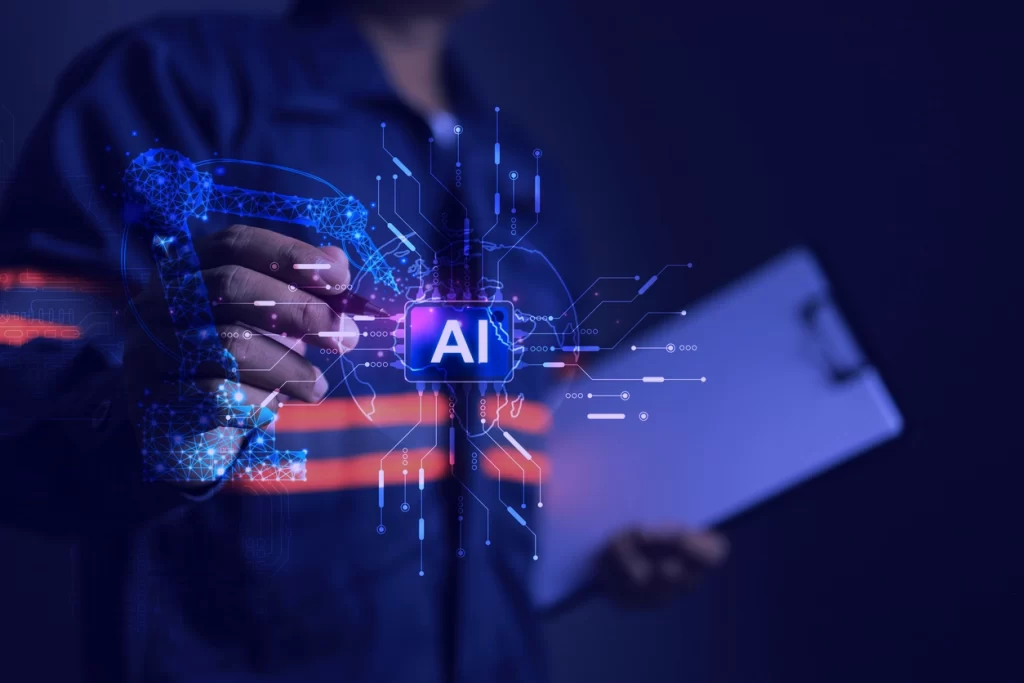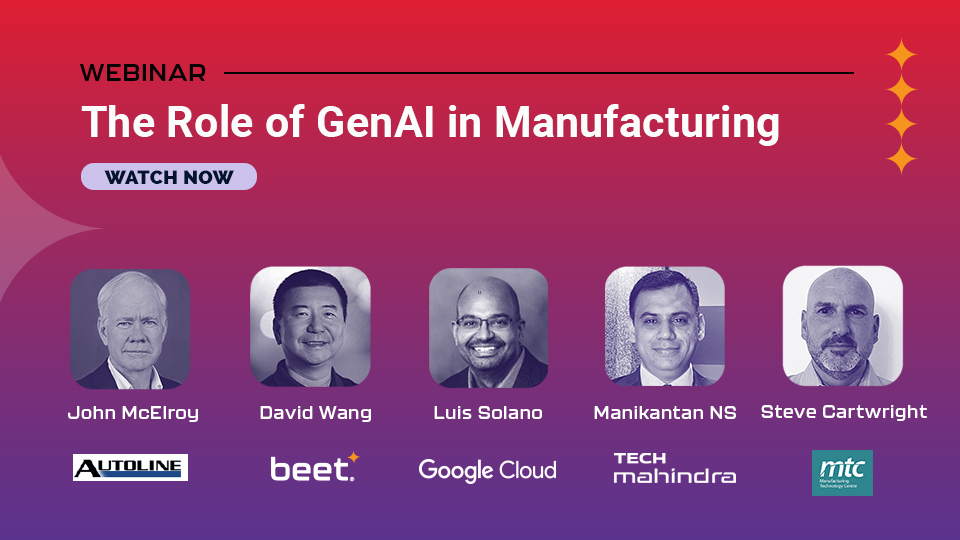Home » A Webinar Recap: The Role of GenAI in Manufacturing


Leaders from BEET, Google Cloud, Tech Mahindra and the MTC discussed the current Industry 4.0 landscape, manufacturing-specific use cases for GenAI, and benefits such as improved analytics and increased worker productivity.

Generative AI is everywhere right now, and with good reason. The technology, if applied strategically, could be an invaluable tool for boosting manufacturing productivity, improving planning processes and demand forecasting, empowering workers, and more.
Sounds fantastic, right? As is the case with any new technology, however, there is no one-size-fits-all approach, and companies need to be intentional about the way they want to drive value for their organization.
To gain a better understanding of the unique role of GenAI in our industry and opportunities for you to tap into this transformative technology, I got together with a few trusted colleagues to discuss Industry 4.0 challenges, manufacturing-specific use cases for generative AI, and the potential benefits.
The discussion was led by moderator John McElroy, President of Blue Sky Productions and the creator of Autoline, and featured Luis Solano of Google Cloud, Tech Mahindra’s Manikantan NS, and Steve Cartwright of the Manufacturing Technology Centre (MTC) in the UK. What’s interesting about our panelists is that each of us comes from a different background. The result was a candid conversation with unique perspectives you won’t find anywhere else.
I’ll share my top takeaways from the discussion below, but I encourage you to dig deeper and continue learning, especially if you’re considering a GenAI project within your operations. Watch the on-demand recording now and get in touch if you’d like to continue the conversation one-on-one.
We polled the audience with the question, “What is the greatest challenge that you face in manufacturing?” You may find the results interesting. Let’s dive right in.

What is the greatest challenge in your manufacturing operations right now?
We kicked off the discussion by asking the audience this question and the results were honestly surprising. A whopping 44% identified emerging technology challenges as their greatest challenge, followed by data overload/inaccurate data at 21%. Labor shortages and uncertainty over how to drive value rounded the top four at 18% each.
My fellow panelists and I know all four of these issues to be distinct problems in manufacturing and a key driver for digital technologies, but there’s something ironic about the fact that the very solutions that companies are embracing to mitigate risk and build resilience are also their greatest challenge. The results of our poll, however, track with the latest data. The World Economic Forum reports that more than 70% of Industry 4.0 projects failed to move out of the pilot phase. Why is that? More importantly, what can we do to change it? (My team has some serious thoughts on this, so much so that I wrote an eBook about it.)
Luis, our Google Cloud expert, shared some statistics that everyone should keep a pulse on. We have about 600,000 open manufacturing jobs any given month, yet just an estimated 20,000 get filled, per the Bureau of Labor Statistics. What’s more, the National Association of Manufacturing and Deloitte anticipate the US having as many as 3.8 million empty manufacturing jobs by 2030.
Honestly, the current manufacturing landscape and state of Industry 4.0 could be an hour-long discussion in itself, but you get the idea. Our industry is facing some serious issues that pose a long-term operational threat and make it difficult to remain competitive. Manufacturers have a variety of options to solve these problems, whether it be GenAI or something else, but the success of these initiatives hinges on quality data. As I like to say, the trouble with data is “garbage in, garbage out.” How confident are you in the accuracy of your data?
An impressive 84% of our webinar attendees are in various stages of exploring or implementing a manufacturing-focused generative AI project! I loved seeing this statistic professionally because BEET Bot, our GenAI co-pilot, is one of my favorite aspects of our new BEET Core 5.0 solution, and it reinforces that other studies I’ve seen are, indeed, based on accurate data. Researchscape, for example, found 82% of manufacturers’ plan to increase AI spending in 2024. Side-by-side with our poll, how cool is that?
Anyway, turning attention back to our discussion, each of our speakers had amazing insights to share, and it drove an organic conversation that was meaningful for me. Since we all come from different backgrounds, I love seeing how we align on many GenAI use cases and our varied viewpoints also brought some unique, new ones to the table.
Here are some of my favorite manufacturing-specific GenAI use cases we explored:
We took a deep dive into some best practices for approaching GenAI in manufacturing. Steve from the MTC advised taking time to identify your specific operational challenges, while Mani from Tech Mahindra reminded us of the importance of sticking to your established KPIs. Don’t reinvent the wheel for generative AI; use the technology to advance your existing benchmark metrics.
Luis from Google Cloud shared three tips for experimenting with GenAI, beginning with ensuring your use case is directly tied to a business process, whether it be planned production, procurement, etc. Interested in the other two tips? Check out the full recording.
Given the many and varied use cases for GenAI in manufacturing, it shouldn’t be surprising that the benefits are equally diverse. Much of what you stand to gain from the technology depends on how you apply it, but we identified several major buckets that are critical for gaining and maintaining a competitive advantage.
Modern manufacturers are under constant pressure to do more with less. With increased competition from foreign markets, inflation, rising costs, and a tight talent market, how can you cut costs and boost throughput? Generative AI offers vast potential.
One of my favorite things about GenAI, and my co-panelists agreed, is that it has the ability to quickly break complex manufacturing data into something everyone can understand. One question I get asked all the time is, “Do I need a college degree to interpret BEET’s reports?” The answer is “no,” because our platform collects real-time data from equipment across your manufacturing floor and BEET Bot, our GenAI co-pilot, translates that data in response to your queries.
Need to generate a report for a meeting in 5 minutes? No problem. Wondering which baselines are drifting? Get the answer with the click of a button. We use a similar approach to generate real-time dashboards that make it easy to keep a pulse on every aspect of your operations.
This is just one high-level benefit of generative AI for manufacturers. The heart of the technology is that it frees up invaluable resources for skill-based tasks, enabling your team to be more efficient.
Another major benefit is that GenAI can do the type of in-depth analysis you need to unearth hidden capacity in your manufacturing processes. Sixty percent OEE is considered passable on most manufacturing floors, but I think AI will close the gap and help more manufacturers reach the gold standard of 85%. As Steve from the MTC pointed out, “Generative AI is going to help with areas that you wouldn’t necessarily associate with day-to-day manufacturing, like a commissioning phase. How quickly does it take a facility to be brought up to speed?” A platform-based solution can actually tell you why you’re building low numbers.
The GenAI benefits are endless. In addition to supporting decision-making, it can ease labor constraints, help you do more with less, provide corrective action, and above all, empower your people in their respective fields. This is the direction we are headed.
I’d like to thank everyone on the webinar for joining me in this forward-thinking discussion panel, and I’m thrilled to see what’s in store for all of us in the world of GenAI. Learn more by checking out the full recording and getting in touch to learn more about BEET Core 5.0 with GenAI.


BEET Inc., headquartered in Michigan, is a leading AI-powered global industrial IoT platform that specializes in intelligent manufacturing and streamlines intricate discrete and continuous manufacturing operations. BEET revolutionizes operations by providing real-time, data-driven insights to teams, machines, and processes, thus boosting operational efficiency and productivity. BEET, renowned for its strong partnerships and accolades like Automation Alley’s Entrepreneur of the Year, has built a reputation for driving production excellence and delivering rapid return on investment.
4000 Town Center, Suite 60, Southfield, Michigan 48075
©2024 BEET® All Rights Reserved